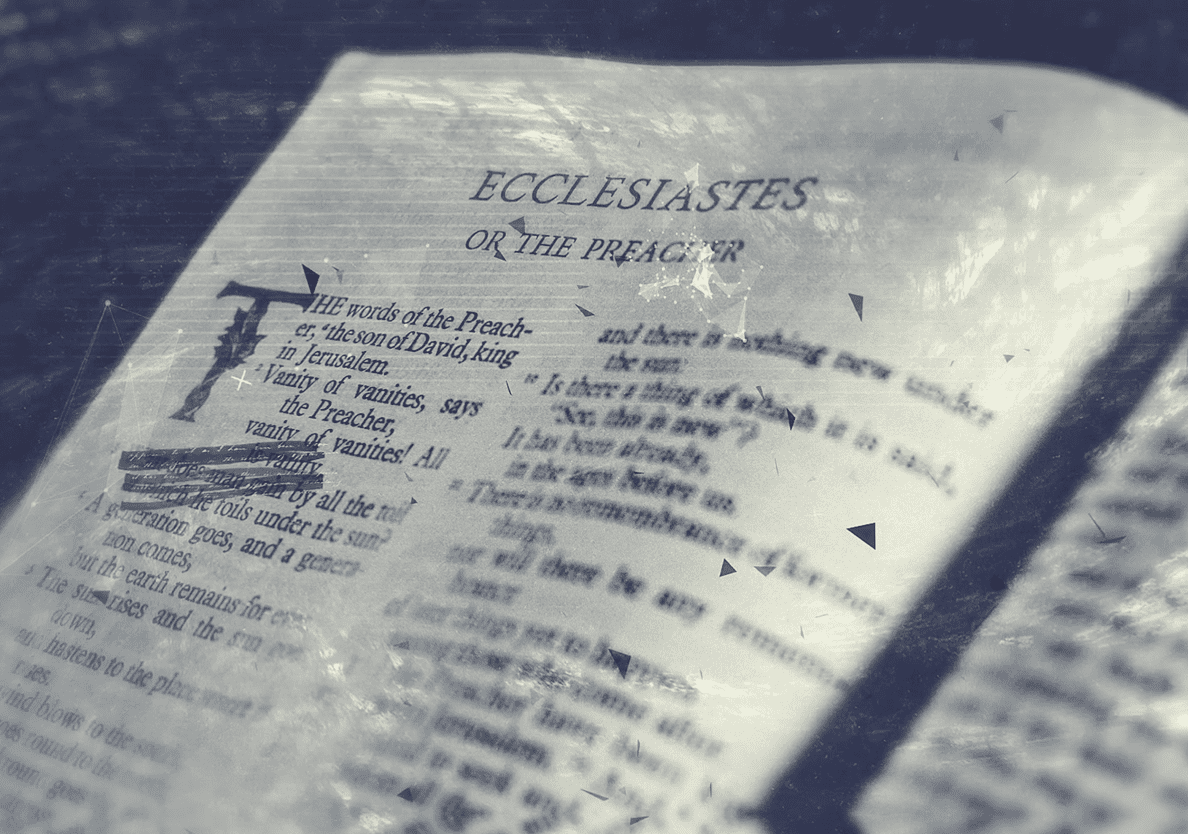Although the Bible clearly teaches from the beginning that every human being is made unique in the image of God and that the soul of each human lives on after physical death, “the preacher” in Ecclesiastes, seems to present a very naturalistic view. In Ecclesiastes 3:19-21, for example, the NIV translation reads, “Surely the fate of human beings is like that of the animals; the same fate awaits them both: As one dies, so dies the other. All have the same breath; humans have no advantage over animals. Everything is meaningless. All go to the same place; all come from dust, and to dust all return. Who knows if the human spirit rises upward and if the spirit of the animal goes down into the earth?” Thus, while the Bible teaches elsewhere that humans are unique and eternal, it seems that the writer of Ecclesiastes is saying just the opposite. Namely, that man is no higher than the animals because we all share the same fate: Death.
“The reason he does so is his perspective—under the sun or without divine revelation. Therefore, the purpose of the book is to teach the futility of life without God.”
Don Stewart
In dealing with this alleged discrepancy there are at least two possibilities. First, it may be that the writer is speaking from a human point of view—an “under the sun” perspective—and making his judgments as if to live without the aid of divine revelation. “From a human perspective, or under the sun, there is no difference between an animal and a human. One does not know if the spirit of the human goes up, and the animal goes down. What is needed is divine revelation to tell us the answer. Otherwise we would have no answer.”[1] So, according to this view, “The writer does make contradictory statements to the rest of Scripture. The reason he does so is his perspective—under the sun or without divine revelation. Therefore, the purpose of the book is to teach the futility of life without God.”[2]


The other possibility is that these verses have been largely misunderstood. One reason for this is because of translational issues. Bible scholar Walter C. Kaiser Jr. points out the word fate is an overtranslation based on our cultural definition of the word, “The word that appears here is merely the word happening. Thus, no references are made to chance, luck or ill fortune. It is solely the fact that one happening, one event—namely, death—overtakes all things that share mortality. The text then affirms that “all go to the same place.” The place that is intended here is not oblivion or nonexistence; it is the grave. Both men and beasts are made out of dust, and therefore it is to the dust that they will return. In that sense, as one dies, so dies the other. Death is no respecter of persons or animals!”[3] But, perhaps, most problematic of all is the translation of verse 21: “Who knows if the human spirit rises upward and if the spirit of the animal goes down into the earth?” Kaiser believes that though this rendering makes it sound as though there is a question regarding the final destination of human and animal spirits, it is not faithful to the original text. Indeed, in “the clearest tones possible” in the Hebrew, this verse states that “the spirit of man rises upward, and the spirit of the animal goes down into the earth.”[4]
Another major problem with using this passage to claim that human souls do not live on after physical death is that these verses have been taken in isolation, and therefore are out of context with the rest of Scripture. As a matter of fact, just two verses prior (v.17), Solomon had already argued that every human being will face the living God at the last judgment. And does so again in his final conclusion (Ecclesiastes 12:13-14).[5]
The Bible is clear: We are very different from the animals and, as such, will face the living God face to face on judgment day.

Ryan Hembree is a daily co-host, speaker, and writer of Bible Discovery. He also hosts a YouTube channel that shows the unity of the Bible and how science and Scripture fit together. Ryan also has an honorary Masters of Ministry in Creation Science from Phoenix University of Theology.
[1] Don Stewart: Don’t Statements in the Book of Ecclesiastes Contradict Other Parts of Scripture about Heaven? https://www.blueletterbible.org/faq/don_stewart/don_stewart_156.cfm.
[2] Ibid.
[3] Walter C. Kaiser Jr., Peter H. Davids, F.F. Bruce, Manfred T. Brauch, Hard Sayings of the Bible, 294
[4] Ibid.
[5] Ibid, 295.






